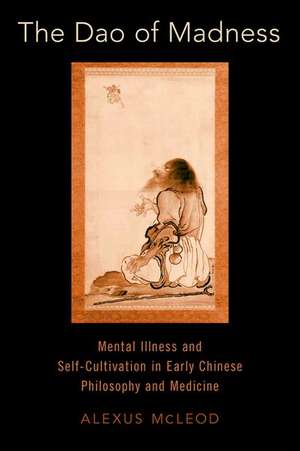The Dao of Madness: Mental Illness and Self-Cultivation in Early Chinese Philosophy and Medicine
Autor Alexus McLeoden Limba Engleză Hardback – 30 dec 2021
Preț: 517.42 lei
Preț vechi: 638.61 lei
-19% Nou
Puncte Express: 776
Preț estimativ în valută:
99.01€ • 103.65$ • 81.92£
99.01€ • 103.65$ • 81.92£
Carte disponibilă
Livrare economică 05-11 martie
Livrare express 28 februarie-06 martie pentru 58.37 lei
Preluare comenzi: 021 569.72.76
Specificații
ISBN-13: 9780197505915
ISBN-10: 0197505910
Pagini: 280
Dimensiuni: 168 x 246 x 31 mm
Greutate: 0.57 kg
Editura: Oxford University Press
Colecția OUP USA
Locul publicării:New York, United States
ISBN-10: 0197505910
Pagini: 280
Dimensiuni: 168 x 246 x 31 mm
Greutate: 0.57 kg
Editura: Oxford University Press
Colecția OUP USA
Locul publicării:New York, United States
Recenzii
The work is an exciting exploration of an unreasonably marginalized topic that should be of interest to a wide array of readers that are keen on Chinese religious philosophies and cross-cultural medical humanities.
This lucid, accessible account of madness in ancient China demonstrates, contra Foucault, that peoples of all cultures make distinctions between the sane and insane, healthy and mentally ill. They do so, however, in vastly different ways - ways that help us think productively about current philosophical issues concerning self, personhood, and agency. Anyone who wants to understand mental illness from a scintillating, cross-cultural and comparative framework should read McLeod's book.
The Dao of Madness is a fascinating work of comparative philosophy. By reorganizing the narrative of early Chinese thought around debates about what counts as madness and sanity, McLeod raises many intriguing ideas to a new level of prominence. Especially noteworthy is the way he brings together discussions from the early medical texts with the philosophical literature. ÃReaders interested in moral psychology, comparative ethics, and different conceptions of human subjectivity will be eager to engage with the diverse early Chinese accounts presented here.
MacLeod's insightful and thought-provoking study may inspire sinologists to explore the changing meaning of madness in early China. For researchers of madness and its history in the West, this masterful book may further their knowledge of the diverse ways of "being mad" in different social and historical contexts.
This lucid, accessible account of madness in ancient China demonstrates, contra Foucault, that peoples of all cultures make distinctions between the sane and insane, healthy and mentally ill. They do so, however, in vastly different ways - ways that help us think productively about current philosophical issues concerning self, personhood, and agency. Anyone who wants to understand mental illness from a scintillating, cross-cultural and comparative framework should read McLeod's book.
The Dao of Madness is a fascinating work of comparative philosophy. By reorganizing the narrative of early Chinese thought around debates about what counts as madness and sanity, McLeod raises many intriguing ideas to a new level of prominence. Especially noteworthy is the way he brings together discussions from the early medical texts with the philosophical literature. ÃReaders interested in moral psychology, comparative ethics, and different conceptions of human subjectivity will be eager to engage with the diverse early Chinese accounts presented here.
MacLeod's insightful and thought-provoking study may inspire sinologists to explore the changing meaning of madness in early China. For researchers of madness and its history in the West, this masterful book may further their knowledge of the diverse ways of "being mad" in different social and historical contexts.
Notă biografică
Alexus McLeod is Professor of Philosophy and Asian/Asian-American Studies at the University of Connecticut. He works primarily in Global and Comparative Philosophy, particularly early Chinese (Han and Pre-Han) and Mesoamerican Philosophy.
